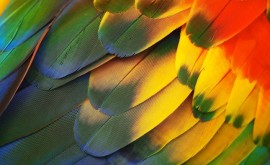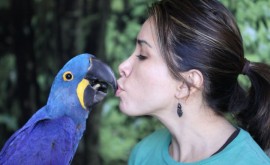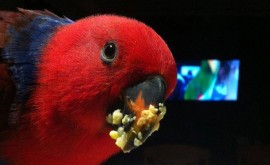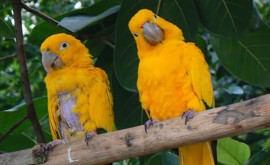One of the most important things to remember about parrots – they are not typical domesticated animals like cats and dogs. To be a bird owner, an individual has to set realistic expectations and respect this beautiful but very complex animal.
Concepts of Parrot Behavior
- Again, a parrot is not domesticated but instead, a wild animal. Even if raised from an egg, it will never be fully domesticated.
- Socialization is critical to raising and owning a parrot
- Although young birds are handfed, a parrot needs to be weaned to self-feed
- Because a parrot is considered a “prey species”, it possesses strong instinctive fear of other prey animals
- To a parrot, its owner is considered part of the flock. Most parrots demonstrate dominant behaviors, which is why the cage should never be taller than the owner and the bird should never be allowed to sit on its owner’s shoulder, both putting the parrot in a dominant position.
- Without doubt, a parrot is extremely social, using a variety of calls in the wild to talk to other like birds. For this reason, an owner needs to talk to the bird throughout the day, something reciprocated with a whistle, chirp, and in some instances, a verbal response.
- In addition to being social, a parrot is highly visual. Along with body language, this type of bird uses eye contact. To calm a parrot down or show genuine affection, a soft, loving expression is best but on the other hand, disapproval of a behavior can be communicated by giving the bird a long, hard stare.
- A parrot is also empathetic, meaning it has the ability to sense and even reflect the mood and energy of its owner
- Interestingly, many experts compare a parrot to a toddler from an emotional and intellectual standpoint
- This species of bird is possessive but also playful and smart
- Because a parrot has a lot of energy but a short attention span, it usually enjoys dramatic displays
Behaviors in the Wild
There are some similarities in the way a parrot acts in capacity versus the wild but also distinct differences.
- In its natural habitat, a parrot will spend most of its time foraging for food, mingling with other parrots, and grooming itself
- A parrot will destroy fruits and leaves as part of the food and nest gathering process whereas in capacity, the process is seen in the form of spitting or throwing food on the bottom of the cage or nearby floor and shredding substrate
- As a way of saying “good morning” and “good night”, a parrot will scream or display some other type of loud vocalization. Even for a talking parrot, these sounds are considered normal. Of course, the exact sounds will vary from one species to another.
Traits of a Good Parrot Owner
Because a parrot is so unique, not everyone makes a good owner. To enjoy this type of bird to the fullest, an owner should possess most, if not all of the following.
- Patience
- Reliability
- Consistency
- Humor
- Empathy
- Dedication to learning the species and specific bird
- Serenity
References
Today, there are multiple resources available for learning about behaviors of different parrot species and training options. These include books, DVDs, CDs, and online publications. While most are really good, the following are considered by avian experts to be among the best.
- My Parrot, My Friend – Bonnie Munro Doane and Thomas Qualkinbush
- Sally Bianchardis’ Companion Parrot Handbook
- Birds for Dummies – Gina Spadafori and Dr. Brian Speer
- Guide to a Well-Behaved Parrot – Mattie Sue Athan




